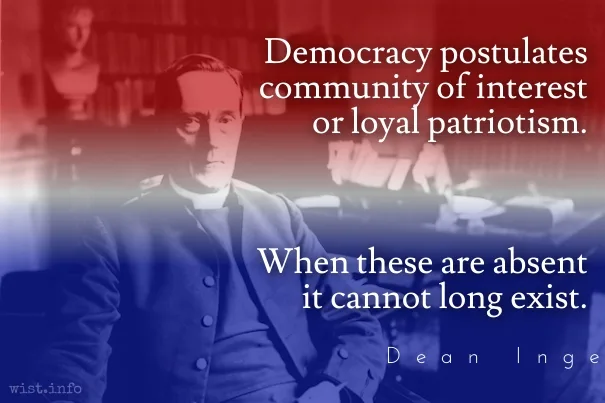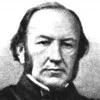What counts now is not just what we are against, but what we are for. Who leads us is less important than what leads us — what convictions, what courage, what faith — win or lose. A man doesn’t save a century, or a civilization, but a militant party wedded to a principle can.
Adlai Stevenson (1900-1965) American diplomat, statesman
Speech (1952-07-21), Democratic National Convention, Chicago
(Source)
Quotations about:
group
Note not all quotations have been tagged, so Search may find additional quotes on this topic.
Of course one does meet brilliant men, but they are isolated. The fashion nowadays is all for groups and societies of every sort. — It is always a sign of mediocrity in people when they herd together, whether their group loyalty is to Solovyev or to Kant or Marx. The truth is only sought by individuals, and they break with those who do not love it enough.
Boris Pasternak (1890-1960) Russian poet, novelist, and literary translator
Doctor Zhivago [До́ктор Жива́го], Part 1, ch. 1 “The Five-O’Clock Express,” sec. 4 [Nikolai Nikolaievich] (1955) [tr. Hayward & Harari (1958), UK ed.]
(Source)
Alternate translations:Yes, there are gifted men, but the fashion nowadays is all for groups and societies of every sort. Gregariousness is always the refuge of mediocrities, whether they swear by Solovyiëv or Kant or Marx. Only individuals seek the truth, and they shun those whose sole concern is not the truth.
[tr. Hayward & Harari (1958), US ed.]You come across talented people. But now various circles and associations are the fashion. Every herd is a refuge for giftlessness, whether it's a faith in Soloviev, or Kant, or Marx. Only the solitary seek the truth, and they break with all those who don't love it sufficiently.
[tr. Pevear & Volokhonsky (2010)]
No solitary miscreant, scarcely any solitary maniac, would venture on such actions and imaginations, as large communities of sane men have, in such circumstances, entertained as sound wisdom.
Thomas Carlyle (1795-1881) Scottish essayist and historian
Essay (1829-06), “Signs of the Times,” Edinburgh Review No. 98, Art. 7
(Source)
But the thing I must point out is that my despair is of the group itself, the group as it’s assembled. And I’ve never identified with the “local group,” no matter what it identifies itself as. But I do cherish, and love, and am thrilled by individuals. People, one by one as I meet them, I find are wondrous. When you have time to listen and watch them, when you look them in the eyes, you see all the potential of the whole thing, this whole species that has such a wonderful gift that was given by nature. The mind, the ability to objectify and to think abstractly. And we’ve wasted it by everyone wanting a fanny pack and to go to the mall and to be paying 18 percent interest on things that we don’t need, don’t want, don’t work, and can’t give back.
George Carlin (1937-2008) American comedian
Interview by Marc Cooper, The Progressive (Jul 2001)
(Source)
It always demands a far greater degree of courage for an individual to oppose an organized movement than to let himself be carried along with the stream — individual courage, that is, a variety of courage that is dying out in these times of progressive organization and mechanization. During the war practically the only courage I ran across was mass courage, the courage that comes of being one of a herd, and anyone who examines this phenomenon more closely will find it to be compounded of some very strange elements: a great deal of vanity, a great deal of fear — yes, fear of staying behind, fear of being sneered at fear of independent action, and fear, above all, of taking up a stand against the mass enthusiasm of one’s fellows.
I do not hate in the plural.
P. G. Wodehouse (1881-1975) Anglo-American humorist, playwright and lyricist [Pelham Grenville Wodehouse]
(Attributed)
When asked, as a former WWII internee, whether he hate the Germans (or the Nazis).
George Orwell, writing in 1945 a defense of Wodehouse's actions while an internee, quoted him in a more complex version of this:I never was interested in politics. I’m quite unable to work up any kind of belligerent feeling. Just as I’m about to feel belligerent about some country I meet a decent sort of chap. We go out together and lose any fighting thoughts or feelings.
Remember, that the wit, humor, and jokes of most mixed companies are local. They thrive in that particular soil, but will not often bear transplanting. Every company is differently circumstanced, has its particular cant, and jargon; which may give occasion to wit and mirth, within that circle, but would seem flat and insipid in any other, and therefore will not bear repeating.
Lord Chesterfield (1694-1773) English statesman, wit [Philip Dormer Stanhope]
Letter to his son, #167 (29 Oct 1748)
(Source)
In a courtroom there is no system on trial, no history or historical trend, no ism, anti-Semitism for instance, but a person, and if the defendant happens to be a functionary, he stands accused precisely because even a functionary is still a human being, and it is in this capacity that he stands trial.
Hannah Arendt (1906-1975) German-American philosopher, political theorist
“Personal Responsibility Under Dictatorship” (1964)
(Source)
There is no such thing as collective guilt or collective innocence; guilt and innocence make sense only if applied to individuals.
Hannah Arendt (1906-1975) German-American philosopher, political theorist
“Personal Responsibility Under Dictatorship” (1964)
(Source)
What is not good for the swarm is not good for the bee.
[Τὸ τῷ σμήνει μὴ συμφέρον οὐδὲ τῇ μελίσσῃ συμφέρει.]
Marcus Aurelius (AD 121-180) Roman emperor (161-180), Stoic philosopher
Meditations, Book 6, #54 (2nd C AD)
Original here. Alt. trans.:
- "That which is not good for the beehive, cannot be good for the bee." [tr. Casaubon (1634); numbered 49]
- "What does not benefit the hive is no benefit to the bee." [tr. Farquharson (1944)]
- "That which is not for the interest of the whole swarm is not for the interest of the bee." [tr. Collier]
- "What injures the hive injures the bee." [tr. Hays (2002)]
- "What is not good for the hive is not good for the bee."
















